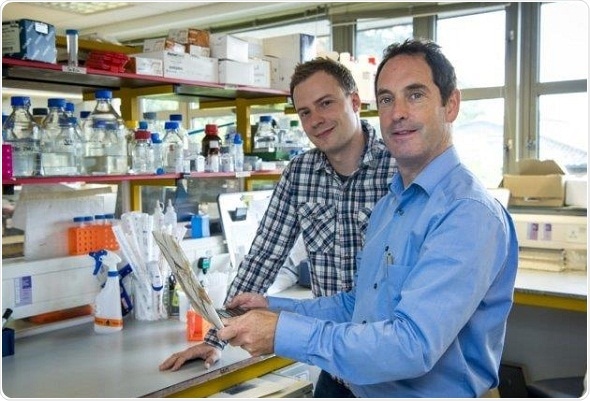Fight for Sight is funding scientists at the University of Cambridge to research how a new ‘molecular scaffolding’ could help restore vital nerve connections between the eye and the brain, potentially recovering the sight loss caused by glaucoma and other conditions, and even paving the way for future eye transplants.

Andy Osborne and Professor Keith Martin
Professor Keith Martin, Professor James Fawcett and team will be working with colleagues at the Centre for Eye Research Australia and the University of Melbourne to investigate the role of a ‘scaffolding molecule’ called protrudin in helping to heal and regrow damaged eye nerve cells, and they believe this molecule could ultimately help lead to successful eye transplants by leading to a strong connection between the eye and brain, as well as helping repair damage from eye disease.
Glaucoma causes harm to retinal ganglion cells - the cells at the back of the eye which relay visual information to the brain. Their long, tail-like axons pass along the optic nerve, which functions rather like the cable connecting a camera to a computer.
The researchers have identified protrudin as “the strongest promoter of optic nerve regeneration we have yet encountered”.
Leader of the study, Professor Keith Martin, said:
Despite all currently available treatments, around 10-15% of patients with glaucoma go blind in at least one eye during their lifetime. Our work aims to develop new strategies to repair the optic nerve and, ultimately, to restore vision in people who are blind due to optic nerve diseases like glaucoma."
It is thought that this work could not only be effective in halting or reversing the damage caused by glaucoma, but also in improving success rates of eye transplants – helping a transplanted eye to connect to the brain by growing axons through the optic nerve.
Dr Neil Ebenezer, Director of Research, Policy and Innovation at Fight for Sight said:
We’re delighted to fund researchers at the University of Cambridge to look into this innovative way of protecting and regenerating retinal ganglion cells. To people affected by sight loss due to glaucoma or other forms of damage to the optic nerve, this Cambridge study may lead to new treatments that restore lost sight by strengthening the connection between the eye and the brain. This donor-funded work could be a game-changer, in terms of helping people make a fuller recovery after glaucoma treatment or following eye transplants.”
Glaucoma is the world’s second leading cause of blindness. It affects 60 million people worldwide – nearly half a million in the UK alone. The optic nerve is crucial to clear sight, and this work could lead to a breakthrough that enables doctors to repair it.